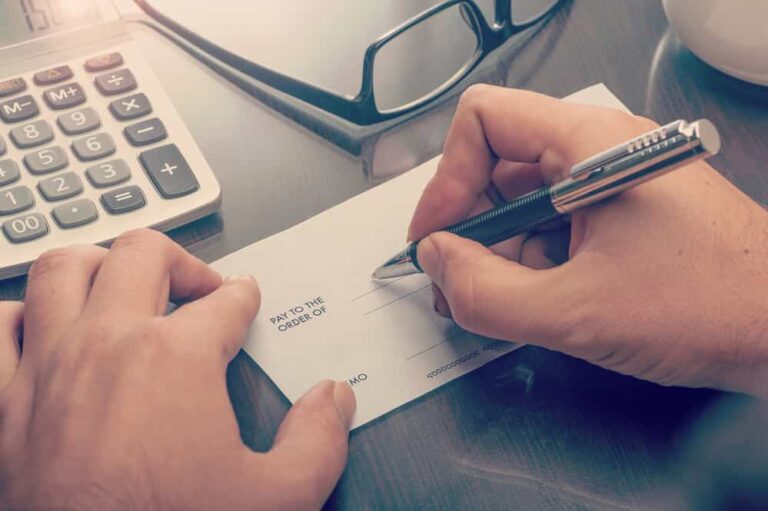It’s easy to get impatient when you know you’re supposed to have money in your account soon, which is why it’s perfectly reasonable to start to wonder if a deposit is pending, can you use the money.
After all, you probably have big plans for that cash! So not knowing just when you’ll be able to use it can be a massive test of patience.
Luckily, we’ve done all the research about that pending deposit you have, so as to answer all your questions about what it means if a deposit is pending.

If a deposit is pending can I use the money?
No, when a deposit is pending, you cannot use the money yet as your bank is in the process of verifying the deposit. Once the deposit is verified, it will be added to your available balance and can then be used.
This can be a bit irritating if you need to use the money as soon as possible, but it’s ultimately for your own benefit.
This is because if there’s a situation where the deposit isn’t approved but you’d already used the money, you would run the risk of overdrawing your account. By using funds in advance that aren’t ultimately able to be added to your account, you’d then be on the hook for the amount you spent.
Personal Capital is a free app that lets you take control of all your money in one place. Track your spending, set financial goals, get personalized tips and more!
What does it mean if a deposit is pending?
If your account says that a deposit is pending, it means that the deposited funds have been received but are on hold, usually because your bank is verifying that the deposit is valid. Funds will be released to your account once the deposit is authorized.
The reason that your account will show that a deposit is pending is so that you know that the deposit has been received and is in the process of being authorized. Otherwise, you may not know whether the bank had actually received this.
As soon as the bank has gone through its verification process, the money should then be switched to being part of your available balance.
You may also be interested in: When You Get a New Debit Card Does the Card Number Change?
Can you withdraw a pending direct deposit?
No, a pending direct deposit is not able to be withdrawn as the deposit is still in the process of being verified by your bank. Once the deposit is authorized, you’ll then be able to use these funds, including to withdraw them.
This is to avoid the situation mentioned above: where you withdraw money that is not then ultimately added to your account, meaning you could be charged overdraft fees.
Instead, as annoying as being patient can be, waiting an extra day or so for the pending verification for your deposit to be processed is much better in the long run.
CIT Bank’s Money Market account has exactly that, including allowing you to deposit checks remotely. Find out more here.
Are pending transactions included in your available balance?
No, pending transactions are not included in your available balance, although they will appear in your current balance. This is because your available balance shows how much money you have to use, while your current balance shows your full financial picture.
This is one reason why it’s important to understand the difference between your available balance and your current balance, as only the amount in the former can be spent or otherwise used.
This is particularly important for financial planning purposes, as if you’re about to make some sort of big financial commitment, keep in mind that you can only rely on having the amount in your available balance on hand.
You may also be interested in:
Can a bank release a pending deposit early?
Some banks can release a pending deposit early for a fee if you ask them. This will only generally apply to deposits that are likely to be authorized, such as a payroll check from your employer. However, this will largely depend on your specific bank’s policies
Not every bank will allow this as an option and some will only offer this when the deposit is either more or less than a specific amount. There are also regulations in place that set limits on how long these holding periods can be.
As such, the best thing you can do here is talk to your bank directly about what options they have for you based on your specific circumstances if you have a pending verification for a deposit that you really, truly need.
Can banks see pending deposits?
Yes, both banks and account holders can see pending deposits, as these will appear as “pending” in your account. However, bank tellers generally won’t be able to see any more information on where in the process your deposit authorization is or the reason for any delays.
That is, if a deposit is going through the standard verification process, there’s normally not much point calling your bank and asking what the hold up is as the only information they will usually have on hand is that the deposit is in the process of being authorized and should be available soon.
However, if there’s been a delay of some sort and you think there’s a problem, the customer service team at your bank should be able to tell you what this problem is. They may also be able to say whether or not there’s anything you as the recipient (or the person who sent the money) can do to allow the deposit to be processed.
All this is to say: if your deposit is pending but appears to be going through the normal process, there’s no point in calling them to ask for an update usually as they’ll simply give you this same line.
How to check direct deposit status
To check the status of a pending direct deposit in your bank account, it’s best to check with your bank, although they may not always have more information. If, however, the deposit isn’t showing in your account, you’ll need to ask the sender for an update on the status.
As mentioned above, most customer service personnel at a bank won’t be able to give you any more information beyond “its’s being processed”. Of course, there’s no harm in trying if you’re really desperate, but just be prepared to get a canned answer.
Does pending mean it went through?
No, if a deposit is marked as “pending”, then it has not gone through yet. Instead, it normally means that the deposit is in the process of being verified. This is why, if a deposit is pending, you cannot use the money at that point.
You’ll know that it has gone through once the funds switch over to being under your available balance, meaning that you can now use the money however you wish.
One thing to keep in mind that a pending deposit will appear under your current balance. Unfortunately, don’t get too excited about this as unless the money is also in your available balance, if you try to withdraw it, your debit card won’t work.
You may also be interested in: I Need to Move Out But Can’t Afford It! What Should I Do?
What does pending mean in banking?
If a transaction is “pending” in a banking context, it means that it is still being processed. For example, if you make a purchase with your credit card, it will often first show as “pending” in your account before actually going through later on.
Similarly, receipts of money into your bank account can also be “pending”, like deposits or some other form of transfer into your account.
If you really need that money, you wouldn’t be blamed for madly wondering how long does a pending deposit take. However, keeping a transaction as “pending” for a short period is very normal and, in the vast majority of cases, the funds should come through within a day or so.
Can a pending deposit be declined?
A pending deposit can be declined for a variety of reasons, including if there isn’t enough money in the originating account or the details are otherwise wrong. This is often done for protection purposes, especially to prevent you from being scammed.
If a pending deposit is declined, the funds will switch from appearing in your account as “pending” to not appearing at all. This means they’ll also be removed from your current balance.
As mentioned, the most common reason for this is that there isn’t enough money in the payor’s account for the stated amount to be sent over to you. There could also be a situation where some of the details don’t line up, meaning the deposit can’t be authorised.

There can be completely innocent reasons for these to happen, but these can also help to prevent scams. One very common one is for someone to write you a check for, say, $400 and to then ask you to give them $380 in cash on the understanding that you’ll keep the extra $20 as a thank you gift.
However, a few days later, you’re told that the check has bounced and suddenly you’re out by $380. Bet you wish you’d used a certified check now, huh?
This is partly why if a deposit is pending, you can’t use the money – nor should you follow the scam above until a deposit isn’t pending anymore, just to make sure that the deposit is legit.
You may also be interested in: When You Get a New Debit Card Does the Card Number Change?
How long does it take for a pending deposit to go through?
A pending deposit will generally take two business days to go through, assuming that the transaction is standard and able to be verified by your bank. This is also on the understanding that the sender has sufficient funds in their account.
There are some situations where it may take longer, such as if you’re depositing a much larger amount than usual. However, in the vast majority of cases, this will only add a couple of extra days to your bank’s processing time.
You can also expect some to be processed faster than this. In fact, for a lot of deposits, if they’re made within a bank’s normal business hours, they can be in your available funds at the opening of the next business day.
There are regulations in place that limit how long a bank can take to process a pending deposit, so that should also give you an idea of how long it can take for a pending deposit to go through at the absolute maximum.
Why isn’t my deposit showing up?
If your deposit isn’t showing up, it’s best that you contact your bank to make sure that there hasn’t been a mistake. As a pending deposit will usually appear in your account even if funds aren’t available yet, it’s worth checking with your bank if you can’t see it at all.
Very occasionally, a deposit can be put into the wrong person’s account. This is extremely rare but obviously something you should fix sooner rather than later to make sure you can access your funds, so a phone call to your bank to clarify what’s happened is generally the best way to go.
Also keep in mind that your account agreement will contain provisions for how long you have to inform the bank about any errors. This is often 30 days from the date of the statement in which the error appears, so you do have time to fix this – but don’t take too long.
You may also be interested in: Can I Use a Check With an Old Address?
At what time do direct deposits go through?
Direct deposits go through at different times for different banks, with some banks doing it at midnight on the day the deposit is authorized and others doing it at the start of business on the day after verification. It’s best to check this with your specific bank.
That is, there’s no blanket answer to the question of what time do pending deposits go through, but it generally doesn’t vary too much. Whether it arrives at midnight or the start of business hours, in practice, you’ll get access to the funds at basically the same time.
A lot of banks now also have a service when you can receive a notification either by SMS or through your bank’s app when a deposit is processed, meaning you’ll know the exact time that your direct deposit goes through.
How do I check the status of my direct deposit?
You can check the status of your direct deposit in your account, which will either mark the deposit as “pending”, as part of your available balance or not appearing at all. If a deposit is pending, you can’t use the funds but if the money is in your available balance, it’s free to use as you wish.
On the other hand, if the deposit doesn’t appear at all, it either means that it wasn’t received or has been rejected.
In either case, if you think that this isn’t accurate, it’s best to call your bank as early as possible to find out what’s happened and to fix the mistake. That way, you’ll be able to get access to your funds as quickly as possible.
Final thoughts on what to do if a deposit is pending
It’s normal to have questions about your deposits, as you’re probably waiting impatiently for the funds to go through so that you can start to spend them.
This means wondering things like “if a deposit is pending, can I use the funds?” makes sense in that context – but, like many things, patience is a virtue here.
That is, you’re unfortunately going to have to wait until the deposit is no longer pending to use the funds. Fortunately, this usually only takes a day or two in the vast majority of cases, so you don’t have too long to wait.
And if that doesn’t happen, the best strategy is simply to talk to your bank. They’ll be able to let you know if there’s an issue and get the information they need from you in order to sort out the problem.





